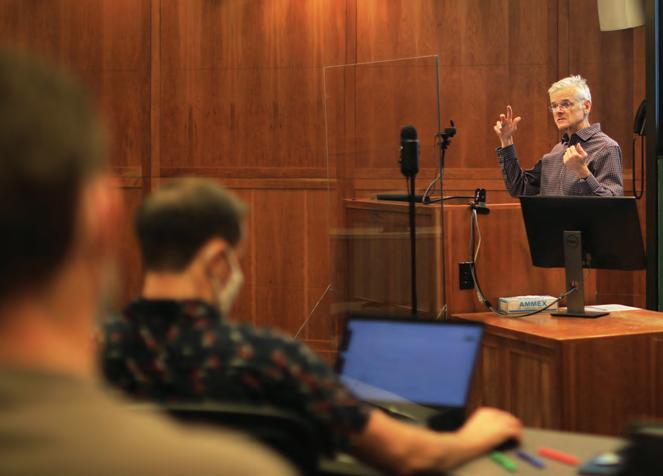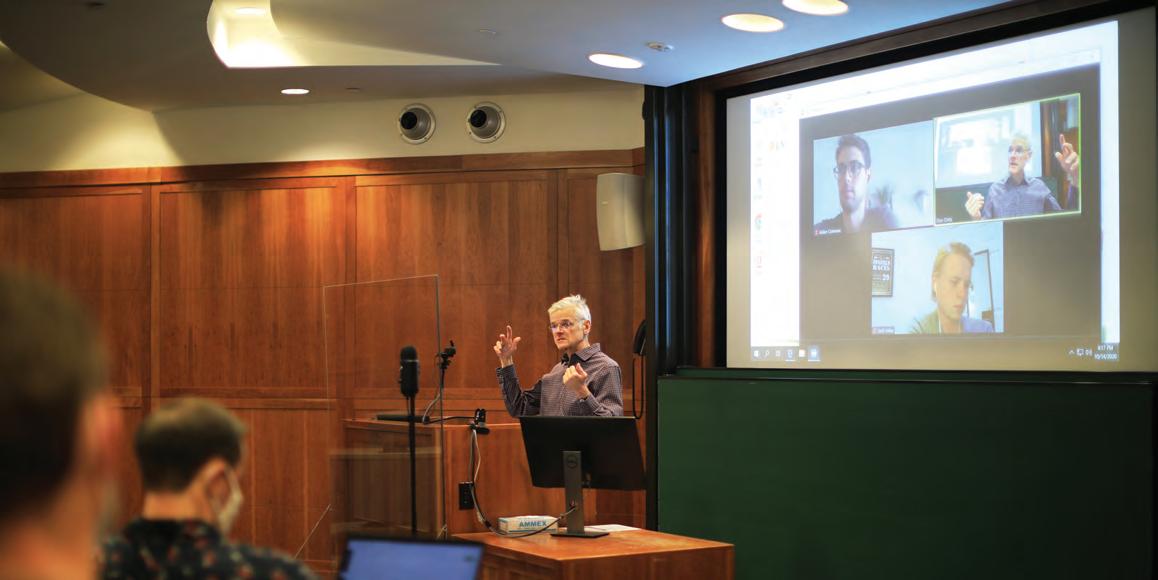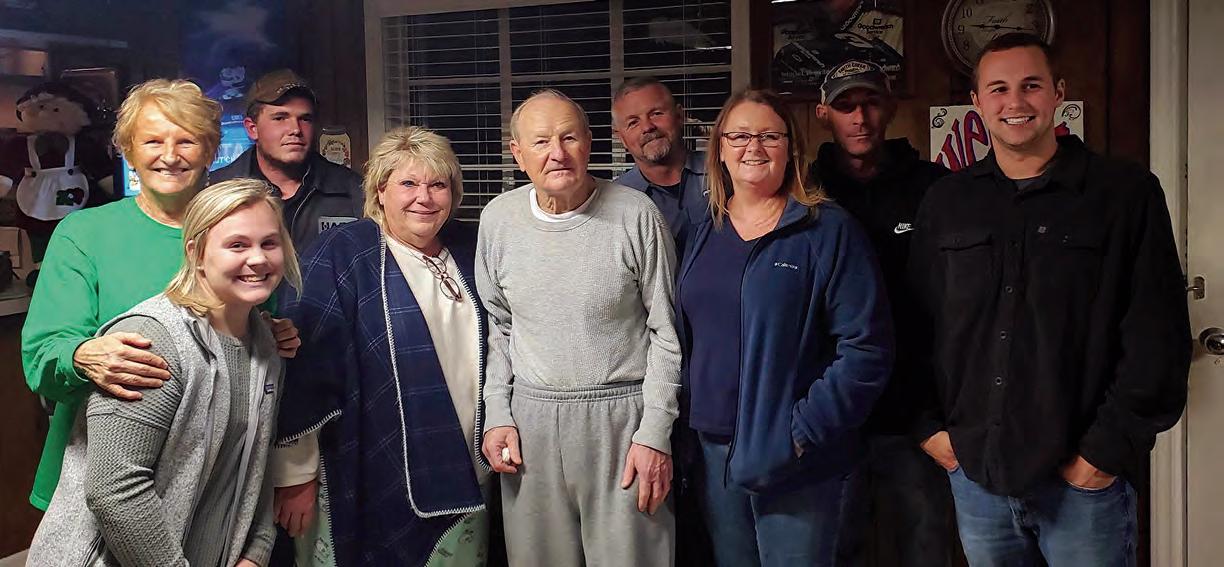
16 minute read
New Faculty
PRIVACY EXPERT DANIELLE CITRON JOINS FACULTY
DANIELLE CITRON, a pioneering law professor in digital privacy who helped Vice President Kamala Harris in her effort to combat nonconsensual pornography as an attorney general, joined the Law School faculty in December.
Advertisement
Citron, the inaugural Jefferson Scholars Foundation Schenck Distinguished Professor in Law, comes to UVA from the Boston University School of Law. Her professorship is funded by the Jefferson Scholars Foundation.
Citron was a recipient of a 2019 MacArthur Foundation Fellowship, informally known as a genius grant, for her work on cyberstalking and intimate privacy, including her efforts to change how the public thinks about online harassment, from a triviality to a civil rights problem. Because women and minority groups are often targeted online, she has made the argument that civil rights law—which can address harms not covered by other laws— could be applied in many cases and would serve “a crucial expressive role.”
Citron helped found the nonprofit Cyber Civil Rights Initiative in 2013, a name inspired by her foundational paper. She has focused her legislative efforts on a multitude of privacy issues in the online environment. Among them is what has been called “revenge porn,” although she and her colleagues at the nonprofit, of which she is the vice president, prefer to reframe the problem as “nonconsensual pornography” in order to emphasize the harm done.
Harvard University Press published her book “Hate Crimes in Cyberspace” in 2014.
The book was hailed as a “call to action and a thought-provoking roadmap” by Harvard law professor Jonathan Zittrain, and as a “lucid summary” that shows “we can do quite a lot for victims of cyberabuse without chilling expression” by University of Chicago law professor Martha Nussbaum.
Cosmopolitan magazine named the book one of the “20 Best Moments for Women” that year.
Through staffers, the book also got the attention of then-Attorney General of California Kamala Harris. Citron ended up advising Harris and her team for two years, and during a portion of that time, served on the Attorney General’s Cyber Exploitation Task Force.
The task force “had a series of meetings, and the first was in person with 50 companies, like everyone in Silicon Valley,” Citron said. “A lot of them didn’t necessarily want to be there, but they came. Google, YouTube, Facebook, Twitter, Pinterest, you name it.”
In direct and indirect ways, the tech giants were enabling nonconsensual pornography, she said. However, because of Section 230 of the federal Communications Decency Act of 1996, which was the first major attempt by Congress to regulate internet pornography, Harris’ office couldn’t pursue action against the tech companies for serving as intermediaries. Courts have interpreted the section as meaning operators of internet services cannot be held liable for what third parties post.
Citron gave a presentation on how the companies’ reticence to act affected the lives of victims. Google, for example, had a handsoff approach related to its search engine and what content would appear in searches of individuals’ names, such as nonconsensual porn. For those instances in which extortion charges couldn’t be brought, the Harris team and their allies ultimately sought a way that the content could be taken down or de-listed.
By the summer of 2015, Google announced that it would de-index nonconsensual porn in searches of people’s names when requested by the affected individual, as did Bing.
In addition to her past service to Harris, Citron has been a member of Facebook’s NonConsensual Intimate Imagery Task Force since 2011, and an adviser and a member of Twitter’s Trust and Safety Task Force since 2009. —Eric Williamson
INTERNATIONAL BUSINESS LAW SCHOLAR JAY BUTLER TO JOIN FACULTY

JAY BUTLER, a Rhodes Scholar and an expert in international law and corporate social responsibility, will join the Law School faculty in the fall.
Butler instructed about 40 UVA Law students in International Business Transactions this past fall as a visiting professor.
He currently serves as an associate professor at William & Mary Law School. He previously was a teaching fellow at Columbia Law School, and has taught as a visitor at Yale Law School and the George Washington University Law School. His writing examines corporations and their adherence to international law, including how they can lead through global governance and policymaking.
In a sense, Butler said, his work is a study in world peace.
“We tend to think that one of international law’s real benefits is its ability to allow parties that have a dispute to solve it peacefully, even if not always entirely satisfactorily,” Butler said. “And I think one of the things that attracted me to international law is that it’s very much in flux. So being able to participate in a project that is unfinished, as opposed to just sort of gilding something that has been effectively done for some time, is appealing. I feel a sense of activism toward peace as a value for human flourishing.”
His recent articles include “Corporate Commitment to International Law” (2021) for the New York University Journal of International Law & Politics, “The Corporate Keepers of International Law” (2020) for the American Journal of International Law, and “Corporations as Semi-States” (2019) for the Columbia Journal of Transnational Law.
“Corporate Keepers” was selected for the 2019 Yale/Harvard/ Stanford Junior Faculty Forum. The paper examines the business of international law enforcement and grapples with the potential of corporations to serve as keepers of international law.
In 2018, Butler won the Lieber Prize from the American Society of International Law for his paper “Amnesty for Even the Worst Offenders,” and later that year, was chosen as a fellow in the Law and Public Affairs Program at Princeton University.
He said his scholarship has been informed by his eclectic experiences. Born and raised in Bermuda, Butler’s country of origin is relatively small yet cosmopolitan.
He earned his bachelor’s in history, magna cum laude with highest honors, from Harvard University and went on to earn a bachelor’s in jurisprudence from Oxford University as a Rhodes Scholar. He earned his J.D. from Yale Law School and is a member of the New York bar.
After law school, he clerked for Judges Hisashi Owada and Giorgio Gaja of the International Court of Justice and worked as a legal adviser to the government of Japan.
Drawing from that experience, he reflected that, “Understanding the adjudicative process as well as the litigation process was really informative for my take on international law and its application. It fostered a degree of creativity in utilizing international law methods to solve problems.”
Professor George S. Geis, director of the John W. Glynn, Jr. Law & Business Program, said Butler’s work is both novel and timely, and he looks forward to Butler’s upcoming contributions to the law faculty.

HEALTH LAW EXPERT CRAIG KONNOTH TO JOIN FACULTY
CRAIG KONNOTH, an expert in health care law, and law and sexuality, will join the Law School faculty in the fall.
Konnoth is currently a law professor at the University of Colorado, where he explores issues of health and civil rights, and health data, in his scholarship. His work looks broadly at minority and marginalized communities, while also focusing specifically on the LGBT community.
“The focus is on how social movements use medicine to drive broader legal and policy change,” he said.
Dean Risa Goluboff said Konnoth’s research homes in on the moment in which we live.
“Craig’s scholarship on health equity is both perennially important and more important now than ever,” Goluboff said. “Craig is working at the cutting edge of a cutting-edge field. He is already having an impact on the way we think about health and health care, and about the relationship between law and medicine.”
Traditionally, the thinking has been that laws are set in place and the field of medicine must abide by them, he said. But this approach “behaves as if medicine doesn’t have its own normative logic. This logic can be [and has been] deployed to oppress and discipline minorities, for example, forcing the sterilizations of women of color in the U.S.”
However, social pressure can change the norms of medicine, which can then change the law, he explained. “My position is that medicine is what we make of it.”
His most recently published article, “Medicalization and the New Civil Rights,” appeared last year in the Stanford Law Review. The piece aims to “define and defend” the concept of “medical civil rights,” in which individuals have advanced civil rights claims that rely on the language of medicine. An example, he said, is states that apply Medicaid funds to help solve homelessness, by linking homelessness to medical outcomes. Konnoth believes that authorities should track the effects on social and economic outcomes on health, just as with pharmaceutical outcomes.
Activism around gender dysphoria—distress caused from not identifying with one’s sex assigned at birth—is also among the issues that Konnoth teaches and writes about, including in a 2018 Pediatrics journal article, “Ethical Issues in Gender Affirming Care.” With children, the legal struggle is often one that sometimes pits the preferences of parents or doctors against a child’s lack of agency and the need to thrive as an individual.
In addition to health and civil rights, Konnoth specializes in health data regulation. His 2017 paper, “Health Information Equity,” appeared in the University of Pennsylvania Law Review, and received the 2018 Privacy Papers for Policy Makers Award.
He is the inaugural faculty director of the Health Data and Technology Initiative at the Silicon Flatirons Center at Colorado.
Professor Margaret Foster Riley, whose scholarship focuses on health law and bioethics, among other topics, joined the dean and her fellow faculty members in welcoming Konnoth.
“His work in health law, bioethics and privacy spans many of the most urgent issues we are facing today,” Riley said. “His recent scholarship in medical civil rights, which focuses on gender and sexuality and race, offers new ideas and solutions to address the continuing health disparities brought into even starker relief by the current COVID crisis.”
Prior to joining Colorado, Konnoth was a deputy solicitor general with the California Department of Justice, where his docket primarily involved cases before the U.S. Supreme Court, and also before the California Supreme Court and the Ninth U.S. Circuit Court of Appeals.
He earned his J.D. from Yale Law School and an M.Phil. from the University of Cambridge, and clerked for Judge Margaret McKeown on the Ninth Circuit. He held fellowships at the UCLA Law School’s Williams Institute before clerking, and more recently, at the University of Pennsylvania Law School and New York University Medical School.. —Eric Williamson
❱The Supreme Court Litigation Clinic, led by Professor Daniel R. Ortiz, continued to meet in person this year.


CLINICS ADAPT TO SERVE THEIR CLIENTS
CLINICS AT THE LAW SCHOOL, which provide students real-world experience in lawyering, haven’t slowed down in light of the pandemic. If anything, they’re Zooming.
“There’s still plenty of work going on,” said Professor Sarah Shalf ’01, director of clinical programs.
Adaptation has been key, as students in the Law School’s 21 clinics have been allowed to either take courses in person or remotely this school year through hybrid learning. Remote conferencing tools such as Zoom have been essential.
The Innocence Project at UVA Law, which hosts both a for-credit clinic and a student pro bono clinic, has taken on more DNArelated cases this year, which require fewer personal interviews, as well as responded to a new opportunity.
“We’ve had a slew of parole hearings for clients who are newly eligible under Virginia legislation that passed last year,” said Juliet Hatchett ’15, a staff attorney with the Innocence Project and the Jason Flom Justice Fellow, who explained that parolees no longer have to make a statement accepting responsibility for the crime. “Normally, those hearings would be in person with one to two family members or significant others present, but we’ve been doing them via Zoom.”
The Appellate Litigation Clinic has been engaging in its normal approach, although that clinic’s students ordinarily fly out to appeals courts throughout the country to argue cases.
“The clinic has probably been affected by the pandemic less than most, since appellate work is primarily focused on research and writing, and the moot court sessions they do to practice for oral argument work very well over Zoom,” said Professor Scott Ballenger ’96, the clinic’s director.
The clinic’s four arguments were all by audioconference or Zoom, he said.
“The students in this year’s clinic have been thrown right into the deep end,” Ballenger said.
As in recent years, seven of the Law School’s clinics are offered in association with the Legal Aid Justice Center. The clinics coordinator for LAJC, Amy Walters ’09, said caseloads have varied based on the public’s needs due to the pandemic and changes in the law.
Walters teaches the Child Advocacy Clinic and the Health and Disability Law Clinic, which she said are “bustling.” In a recent case that fell under Child Advocacy, students working from Colorado and New Jersey were able to help a high school student with severe disabilities get back to in-person instruction.
But with fewer opportunities for studentcounselors to connect with a client in person, is the human touch getting lost in the process?
“The crucial thing that students hopefully are learning is how not to make it impersonal to communicate by Zoom or by telephone and to make a more intentional effort to build rapport with the client,” Shalf said.
LAJC hosted discussions early on to discuss the challenge.
Confidentiality at times may be an issue, she said, given that it may not be clear who is listening in, and the capacity for the client to understand what’s being communicated may not always be obvious on a call or even Zoom.
Lorish said that for post-conviction work, developing empathy over distance is standard, and crucial.
“You’re always trying to maintain the relationship through the phone and trying to be a good listener and trying to demonstrate compassion and care for your client,” she said.
Even with so much remote work being done, where courts are meeting in person, students such as those in the Prosecution Clinic and the Immigration Law Clinic have been able to participate in person on a limited basis. —Eric Williamson
❱Gerald Smith, center, a Federal Criminal Sentence Reduction Clinic client, greeted family members after a judge granted him compassionate release in December.

NEW CLINIC SEEKS PRISON SENTENCE REDUCTIONS

SEVENTEEN YEARS into his 25-year felony prison sentence, Gerald Smith was facing a looming health crisis. The COVID-19 pandemic disrupted his regular treatments for cancer, a preexisting condition that made him more susceptible to dying from the coronavirus in prison.
With help from the Law School’s new Federal Criminal Sentence Reduction Clinic, Smith was both granted a release and freed on Dec. 17.
Through the clinic, students are working directly with clients to file motions in U.S. District Courts to reduce both the prison time and supervised release portions of their clients’ sentences.
Each student has four clients assigned to them, and students work independently for those clients, while sharing drafts and workshopping the cases with the entire class. The fall clinic was comprised of third-year students Linden Atelsek, Eleanor Coates, Mark Duda, Dominique Fenton, Cody Fisher, Catherine Guerrier, Maria Luevano, Matthew Nicholls, Jonah Panikar and Jake Sillyman.
Fenton was in charge of Smith’s case, which involved felony drug and firearm convictions. Before law school, Fenton served as a Youth and Family Court judge in Oglala Sioux Tribal Court, as well as a legal advocate in Tribal Court and a court-appointed defense investigator in federal criminal cases on Indian reservations. He previously participated in the Innocence Project Clinic and Civil Rights Clinic.
Lisa Lorish ’08, an assistant federal public defender for the Western District of Virginia who directs the clinic and supervises the students’ efforts, had planned to teach her usual Criminal Defense Clinic again, but the pandemic put in-person court appearances and one-on-one client meetings on hold, giving her an opportunity to launch the new clinic last fall. The clinic has helped free four people, including Smith, who faced coronavirus-related health concerns in prison. They include a second client that Fenton also helped free.
“In each of those instances, the individual was at a facility where there were a number of COVID cases and had conditions that really placed them at risk, according to the Centers for Disease Control and Prevention list of medical conditions that place someone at high risk,” Lorish said. “The government, typically, will agree that someone is at least eligible to be considered for release if they have one of those conditions.”
Under the First Step Act of 2018, an incarcerated person may file a motion for a reduction in sentence, also known as compassionate release, directly with the court 30 days after making a request to the Bureau of Prisons or after exhausting administrative remedies. The clinic is also taking advantage of a U.S. Court of Appeals for the Fourth Circuit ruling in December allowing compassionate release over disparities in the harshness of past drug sentencing compared to today, Lorish said. —Mike Fox








